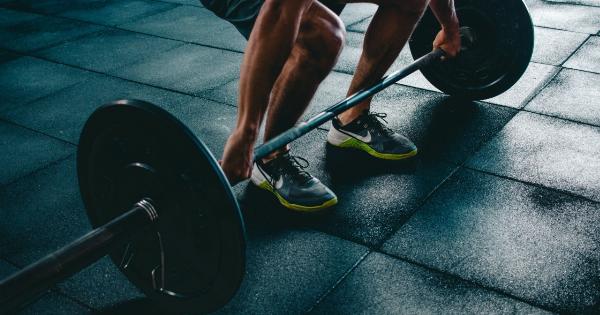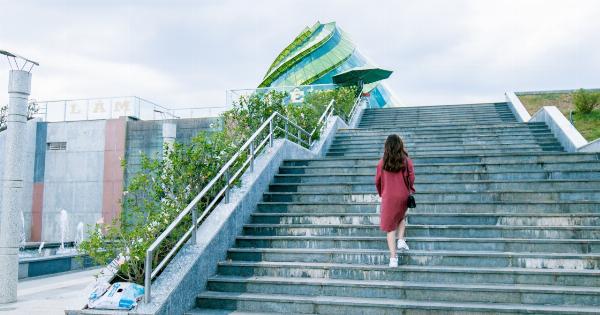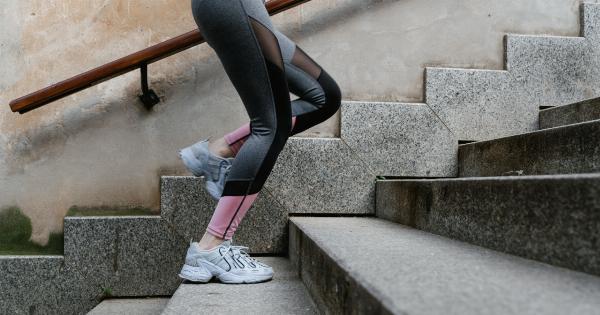Stairs are a part of our daily life, and we often take them for granted. Going up, we rely on our leg muscles to power us, and going down, we trust our balance to prevent us from falling.
However, there is one bad habit that we often do on the stairs that can slow us down and even put us in danger.
Habit #1: Skipping Steps
We all know that feeling of wanting to hurry up the stairs, but skipping steps is a dangerous habit that can lead to falls and injuries. Not only does it make it difficult to maintain balance, but it also puts extra pressure on your knees and ankles.
Additionally, if you’re carrying something, it can throw off your balance and make it even more dangerous.
Habit #2: Looking Down
When we climb up the stairs, we often look down at our feet to see where we’re stepping. While this may seem like a natural response, it can actually slow us down and cause us to lose our balance.
Instead of looking down, we should focus our gaze on the next step ahead and trust our peripheral vision to keep us safe.
Habit #3: Not Holding the Handrail
Handrails are there for a reason, but many of us ignore them completely. Not only does holding the handrail provide extra support and stability, but it also helps us navigate the stairs more efficiently.
When we don’t hold onto the handrail, we waste energy trying to balance and can become fatigued quickly.
Habit #4: Wearing the Wrong Shoes
Wearing high heels, sandals, or flip flops can make it difficult to climb stairs safely and efficiently. Not only can these shoes throw off your center of gravity, but they can also cause you to slip on slick surfaces.
Wearing shoes with good traction and a solid sole can help you climb stairs with ease and reduce your risk of an injury.
Habit #5: Rushing Up and Down the Stairs
There is nothing wrong with moving quickly up or down the stairs, but rushing can be dangerous. Not only does it increase your risk of a fall, but it can also cause you to trip or lose your balance.
Take your time and be careful on the stairs, especially if you’re carrying something or have any mobility issues.
Habit #6: Carrying Too Much Weight
The more weight you carry up or down the stairs, the harder it will be on your body. Not only can carrying heavy loads slow you down, but it can also put extra strain on your knees and ankles.
If you need to carry something heavy, make sure to take breaks and use proper lifting techniques to avoid injuries.
Habit #7: Ignoring Pain and Discomfort
If you’re experiencing pain or discomfort when climbing the stairs, it’s important to listen to your body and address the issue. Ignoring pain can lead to serious injuries, and it can also slow you down over time.
If you have any concerns about your ability to climb stairs, speak with your doctor or physical therapist for advice.
Habit #8: Using the Wrong Technique
Believe it or not, there is a “right” way and a “wrong” way to climb the stairs. Using the wrong technique can cause unnecessary strain on your body and slow you down.
When climbing the stairs, make sure to keep your back straight, engage your core muscles, and take one step at a time. Additionally, always keep your feet flat on the stairs and avoid leaning forward or backward.
Habit #9: Not Staying Hydrated
Staying hydrated is important for overall health, but it’s especially crucial when climbing the stairs. Dehydration can cause fatigue and muscle cramps, making it harder to climb the stairs efficiently.
Make sure to drink plenty of water before and after climbing the stairs to keep your body functioning at its best.
Habit #10: Not Taking the Stairs
Finally, the most obvious bad habit when it comes to stairs is simply not taking them. Many of us opt for the elevator or escalator instead of climbing the stairs, but this can have negative effects on our health and fitness levels.
Climbing the stairs is a great way to get your heart pumping and burn calories, so make sure to take advantage of this natural exercise whenever possible.





























